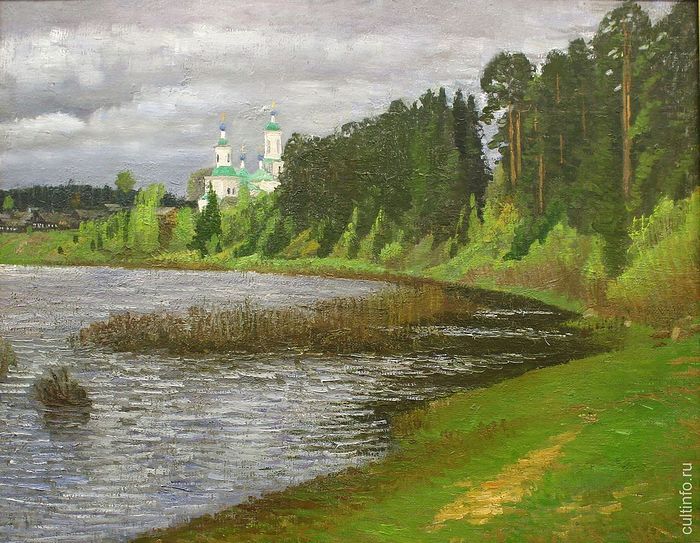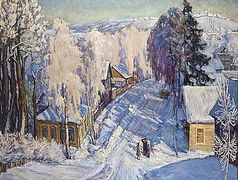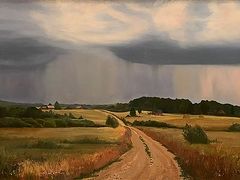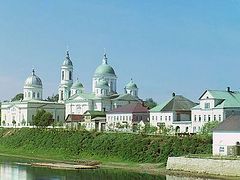Twenty-five years ago, artist Vladimir Fedukov moved with his family from the city to a rural village in the Russian north. Writer Stepan Ignashev talks with him about Russian realism in both art and life.
* * *
In my opinion, the main thing here was the sense of composure. Kind composure, carefulness, and peace. This composure was maintained even when we found that while we had indulged in the conversation the little son had gobbled down two peaches, thus spoiling a supposed still-life composition! But Vladimir said: “Never mind! But please don’t eat the pits—I am going to use them. It will be a genuine still-life!” What is the reason behind such serenity and benevolence? It’s an attempt to look at people and God’s world with kind eyes.
Joy for the “bespopovtsi”[1]
There is a cozy and conscientiously restored parish house by the Church of the Protection of the Theotokos on the high bank of the River Sukhona. Taiga[2]. Hawks. Cranes. It was windy. But Vladimir and other workers had no time for “the romance of country life”—they wanted to finish the construction of a storage shed before the rain and carry the things that had been scattered around the church during the never-ending repair for a long time into it. The artist hastily reminded me where I could find the things I might need, asked me not to gorge on peaches (recommending they try Russian spice cakes instead—they’re tastier), and hurried to his unfinished shed. And we weren’t hurt at all, knowing that work is work, that “if you can’t help, then at least don’t get in the way”, and that they were snowed under with work.
Vladimir Alexandrovich and his family have lived in Ust-Pechenga—a village in the Vologda region [in the northern part of European Russia.—Trans.]—for twenty-five years. And he never once regretted the choice he made. And it’s not a matter of “pastoral life”; if he has ever pictured to himself a “rural idyll“”, all the illusions “vanished into thin air” within a month of real country life. By the way, there were in fact no dreams of “pastoral scenes”. Vladimir knew what he was doing when he left the city forever with no regrets. He is very good with his hands, so he wasn’t afraid of difficulties. And whenever he faces problems, he is supported by parish friends, his own children (there are five of them), and locals, who, as it turned out, care about the state of the main building in the village. It’s neither a shop, nor a club, nor something else; it’s a church, which survived the twentieth-century persecution and once served as the only active place of worship for a radius of over 130 miles. As Vladimir jokingly says, his family’s major concern is “Kirche, Kinder, Küche” (“church, children, kitchen” in German)—the village can’t do without German!
Jokes aside, they have a myriad of chores. Let’s take the church—due to a catastrophic lack of priests this small community in a northern village worships without a priest—they conduct the Typika on Sundays and sing the Akathist hymn to the Protecting Veil of the Mother of God. For the “bespopovtsi” (the priestless community) the monthly Liturgy becomes an occasion of joy and not a mere obligation to “stand through a boring service”.
A tragedy of “optimization”
As for local children, they only increase in number during summer when they come to spend their vacation in the village. It is easy to discern which are the “urban children”—they don’t say hello to anybody they meet in the street. But within two weeks their grandmothers drum good manners into these children’s heads and they begin to greet anyone who passes them.
 Vladimir Fedukov. A Rainy Day. 2009. Canvas, oil.
Vladimir Fedukov. A Rainy Day. 2009. Canvas, oil.
The kitchen, food, sustenance, and social support are typical features of a village which is being “optimized”. Food is more expensive than in the cities. It is good that hard-working people live in the village, so their kitchen-gardens thrive despite the “quirks” of the weather. The kindergarten was closed. The school (once a ten-year secondary school) was “optimized” and ceased to exist. Only gaping holes were left of the windows of the classrooms, in which lessons were still held only two years ago. The village hall’s roof collapsed, and it is moving to the kindergarten’s building which is no longer a place where children go.
But the main problem is total unemployment—there are no jobs at all. All the hard-working village residents have been left jobless! It is enough to look at the well-attended houses and plots of land in most of Ust-Pechenga to understand how assiduously these people would work in agriculture or any other sector. But that’s not the case. Therefore, there is nothing more for young people to do here. So younger residents leave the village, sometimes with their parents. Thus, Ust-Pechenga, formerly a thriving community, is turning into a summer cottage village which returns to life for just a couple of warm summer months every year, when summer residents and vacationers (from among both the natives and “newcomers” who decided to build a house here) come back.
A picture of the world without God is incomplete
 Vladimir Fedukov. The Snow Has Fallen. 2018. Canvas, oil.
Vladimir Fedukov. The Snow Has Fallen. 2018. Canvas, oil.
If we add disheartening news reports of the life of the Church (which are not infrequent) to the sad reality in the world, then one might give in to grief and despair. But this could only happen to someone who doesn’t share Vladimir’s views. And this is what he, Vladimir Alexandrovich Fedukov—the head of a large family and a Realism artist who has looked after the Church of the Protection for twenty-five years; a man of deeds and not words. He said to us during our evening tea:
—The point is this: I have travelled through Russia extensively, admiring its sky landscapes. Once, while preparing one work, I arrived at the conclusion that a picture of the world without God is incomplete. It seems as if you can find everything in the painting: a forest, a river, the sky, and a boat. However, you realize that something is missing. But once a church or even an allusion to a church has appeared, all falls into place. The same is in our everyday life: even if you lay yourself out to do something but don’t have Christ in your mind, you will never have inner peace. That’s the point!
Let’s be realistic
 Vladimir Fedukov. Spring Is Coming Soon. 2009. Canvas, oil.
Vladimir Fedukov. Spring Is Coming Soon. 2009. Canvas, oil.
—Does it mean we should add churches to our landscapes artificially?
—Certainly not. The memory of God is not a “labored”, importunate thought that “beats you over the head”; rather, as I see it, it is peace, gratitude, and light that comes from your heart naturally. As for cramming churches into landscapes or other artificial deeds, I think that’s all unnecessary, and may even have a harmful effect. Why not speak about God by showing the beauty of His creation, say, in still-life paintings? Take our Dutch and Flemish masters—why are all of their flower petals are painstakingly detailed? Didn’t they want to show their Creator? True, a lot depends on how you look at this, both the painter’s and the viewer’s worldviews. Looking at creation with kind eyes testifies to the Creator very logically.
 Vladimir Fedukov. At the Edge of a Forest. 2003. Canvas, oil.
Vladimir Fedukov. At the Edge of a Forest. 2003. Canvas, oil.
—The recent exhibition of your paintings in the Vologda Regional Picture Gallery was a great success. All the people I spoke with said: “It’s so good that Russian Realism hasn’t disappeared as a style. And he (that is, you) is so unpretensious, doesn't claim to be ‘exceptional’.”
—I believe the point is that we are simply tired of these “claims of being exceptional”. We miss modest simplicity and natural beauty very much. If you live in a northern village with its peculiarities, then, believe me, you will have no time to show off. I don’t want to say that I am modest, but I am speaking of my desire to reflect this naturalness and simplicity in landscape as far as I can. Frankly, I am not a good speaker—I prefer working.
A return to active contemplation
—A northern village with all its disadvantages: the lack of education, industries, health services, young people and children won’t lift your spirits. But you and your family live here despite everything. Was it your escape from the world, an internal “city-to-country migration”?
—No, it’s my permanent care for my family and church. I wouldn’t call what we did twenty-five years ago an “escape from the city”—we just didn’t need city life anymore. We have a car and we travel to the city when the need arises. We didn’t have “internal migration” in mind at all; rather, we moved where we could learn to look at other people and the world more attentively, and return to contemplation—I would say, even active contemplation. I doubt if city residents, who live in the hustling, bustling and often aggressive environment, have this opportunity.
And our life cannot be compared to that of recluses either. Do you remember Miss Marple’s words about country life: “There was always something going on, something one could get one's teeth into” [from A Caribbean Mystery by Agatha Christie.—Trans.]? That is true: sometimes there are such interesting encounters! We have met and made friends with amazing people! Apart from numerous priests, artists and writers, we also meet travelers, who spot our church while rafting, then moor to the shore, disembark, and ask us to tell them about the church. Later many return with their friends. In the summer we have more guests, though there are quite a few of them at any season. So this place is anything but boring.
There may be saints here
—Perhaps many in our days have an excessively idealized image of the “spirituality” of the Russian village, where every other resident is allegedly a “fool-for-Christ”, if not a holy man or woman. Alas, I know by experience that it’s far from true.
—Fr. Alexei Novikov of blessed memory used to say: “Don’t hurry to quarrel furiously with someone who has hurt you or with whom you have had an argument. It’s quite possible that the same person will save your life tomorrow.” He was absolutely right. I wouldn’t dare to equate all Russian country people with “holy God-pleasers”, but I know for sure that saints may appear here. In the era of the Communist persecutions, when our church was the only active church in this area, people from other villages and towns would walk here to attend services. They would arrive before the Vigil and leave the next day after the Liturgy. And they would go on foot! Some covered about forty-five miles within one day. This podvig, overwhelming for us, was absolutely natural for those simple, modest Christians. They would stay overnight here in Ust-Pechenga; all the villagers would provide the worshippers shelter for the night, though they weren’t necessarily church-goers. There was a silly local saying: “Ustians are not Christians”—it is a narrow and wholly biased point of view. Come to think of it, can bad people really help others come to church, receive them amicably, care for them, and give the hospitality?
Let’s take our days. Not long ago our benefactor donated about thirty cubic meters of firewood for the church to use for heat. And he prefers to remain anonymous, saying: “There is no need for you to talk about me. As for me, I have nothing to boast of.” And even those who show up in the church at the most once a year volunteered to help us stack the firewood, saying: “We cannot do otherwise!” We coped with the task within a couple of days. We worked together, shared tea and cakes, played the harmonica [a kind of Russian button accordion.—Trans.] a little, and had a good chat. Isn’t this true Christianity? And who am I to judge those who aren’t walking towards Christ the way I expect them to? I will repeat: It all depends on the way we look at the world and others and on our ability to look attentively, without judging anyone. To put it simply, you look with your hearts and contemplate.
 Vladimir Fedukov. Snow in Late November. 2008. Canvas, oil.
Vladimir Fedukov. Snow in Late November. 2008. Canvas, oil.
—I recall that in my own village we had an ironclad rule: If you see a wayfarer while you’re driving, take care to give him a lift. Is the same rule observed here, or have the “commodity-mercantile relationship” (“you scratch my back and I’ll scratch yours”) of our times had their impact on the souls and minds of people?
—All works well. Their souls have remained unaffected, but their minds do not always manage to keep pace with their souls. My wife and I recently had to drive to the city, but the car suddenly broke down. We reached the highway leading to Vologda to thumb a ride. One vehicle finally stopped, and a few tipsy guys got out of it. They said, “You see, we have just been at a funeral gathering. Our friend died. But we will give you a lift, no problem. Please, get into the car. But don’t be afraid of this, in the back…” My wife looked and saw a coffin. The men went on tranquilly: “Our friend has died, and we are on our way to bury him. He’s been ‘packed up’, so don’t worry—you’ll be safe. Come on!” With such a driver, my wife confessed she was more frightened at the prospect of ordering another coffin—this time for herself—rather than by a coffin with a dead man inside. So we thanked them and declined.
 Vladimir Fedukov. Early Winter. 2002. Canvas, oil.
Vladimir Fedukov. Early Winter. 2002. Canvas, oil.
—That’s surrealism, Russian style: you don’t know whether to laugh or cry. It has everything: their willingness to help, care for their deceased friend, sadness, and a way of dealing with grief that can be hazardous to the other people’s health.
—Yes, we have more than enough surrealism. I wish we could have less of it. As for me, Realism is closer to my heart. Kind Realism, which speaks about God. By the way, let your youngest son finish up the peaches, and I will get back to the still-life composition later.





